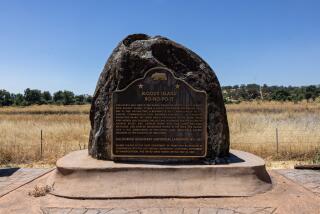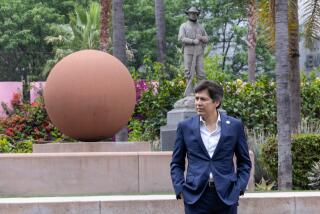King Way Loses Name in S.D. Vote : Switch Back to Market St. Wins by a Wide Margin
SAN DIEGO — In a decision that some predict could send racial shock waves throughout the city, San Diegans voted overwhelmingly Tuesday to strip the name of Dr. Martin Luther King Jr. Way from a major downtown thoroughfare and reinstate the name of Market Street.
By approving Proposition F, which calls for the name change, voters nullified a 1986 City Council decision to honor the slain civil rights leader and handed political victory to a group of downtown merchants who forced the issue at the ballot box because they said the council vote was taken without proper public notice.
Tod Firotto, president of the Keep Market Street Committee, the group that sponsored the initiative, said he was “overwhelmed” by the outcome and added that it showed voters believed the name change had nothing to do with racism.
Stressed Historic Name
Firotto said his group “conscientiously and consciously” avoided discussion that would pit “black versus white,” concentrating instead on the historic significance of the Market Street name.
The vote “may turn out to be an even bigger statement regarding the city’s demand for representative government,” he said.
Mayor Maureen O’Connor agreed, adding that her recent campaign forays into shopping centers showed the King name losing big.
“It was very clear that the proposition was going to pass because people disagreed with the process used and they also wanted to protect the tradition of Market Street,” said O’Connor, honorary co-chairman of the Keep Martin Luther King Way--No on F Committee.
Swift Replacement Urged
O’Connor said she will urge her council colleagues to act swiftly to find another street or something else to name for King.
Michel Anderson, O’Connor’s pro-King co-chair, agreed.
“It should be something bigger, better and grander than a 6 1/2-mile stretch of thoroughfare where there are private property owners.
“I think whatever is selected now should be completely within the public domain, and I think it should be something like the convention center,” he said.
In removing King’s name from the street, San Diego now becomes the second U.S. city in which voters have revoked a memorial to the Nobel Peace Prize winner. Last month, voters in Anchorage, Alaska, removed King’s name from a new performing arts center. In addition, a King holiday was discontinued for some state workers in Arizona.
Local black leaders have warned that repealing the name of King Way would offend the minority community and besmirch San Diego’s national reputation just three months before the city plays host to the highly publicized Super Bowl XXII.
They predicted that the initiative would cause San Diego to suffer the same kind of economic backlash as Arizona, where the governor earlier this year rescinded an administrative holiday honoring King for executive branch employees. In response, dozens of convention groups canceled their plans to gather in Phoenix, costing that city at least $25 million in tourist money, according to tourism officials there.
Dire Predictions ‘Mistaken’
San Diego tourism officials, however, have downplayed that possibility, and the merchants supporting the Market Street name said such dire predictions are mistaken.
The merchants emphasized that their campaign to repeal King Way was not a slap to the memory of the slain civil rights worker but was motivated by several other reasons--such as confusion for customers and hassles with listings in the yellow pages.
But the main thrust of their argument, Firotto said, has been the historic significance of the Market Street name, which has designated the 6 1/2-mile stretch of center city roadway since 1915.
The street in question begins at the bay and moves due east, where it is straddled by the promising signs of downtown redevelopment before it proceeds through some of the more impoverished neighborhoods of the city. According to the 1980 census, the median income in census tracts along King Way is $11,294--about $500 less than the city’s median income.
Neighborhoods touching King Way are also heavily minority. Residents in the adjacent census tracts are 41% black, compared to the city’s average of 8.8%.
The street became the compromise candidate as a memorial to King after council members agreed in principle to name something after him to coincide with the first federal holiday bearing his name.
First Idea Shot Down
At first, then-City Manager Sylvester Murray suggested changing the name of a five-mile stretch of Euclid Avenue and 54th Street, but the idea triggered an angry, vocal protest by residents along that route. Under pressure, the City Council chose Market Street during an April, 1986, public hearing.
That action, however, upset merchants along the western end of Market Street, who complained that the decision was made without proper public notice. Council members declined to reconsider the vote, and the merchants countered by collecting more than 80,000 signatures to put the matter on the ballot as a citizens’ initiative.
Though the potential existed for a particularly nasty, racially tinged campaign, the political duel over the issue remained relatively low key until last week.
Pro-Market Street forces, hoping to avoid charges of racism, avoided public debates with their opponents and spent virtually no money in the waning days of the race except for a quarter-page newspaper ad over the weekend. Firotto said his group spent most of its money--about $35,000--just to put the measure on the ballot.
Relying on the Truth
Otherwise, the merchants were pinning the outcome on “optimism and the hope that the voters will recognize the truth and acknowledge the facts behind Proposition F . . the loss of history and the lack of representation.”
Pro-King forces, backed by the San Diego Urban League and the Baptist Ministers Union of San Diego and Vicinity, were more active down the home stretch.
They sponsored a downtown march over the weekend, advertised heavily in minority newspapers and released a radio commercial featuring singer Harry Belafonte, who urged a “no” vote to avoid a “slap in the face” to the memory of King. They spent $20,000 to $25,000, said Anderson, who is also chairman of the state’s King Holiday Commission.
The pro-King side also racked up several significant endorsements from groups such as the Greater San Diego Chamber of Commerce.
“Our endorsement list reads like a Who’s Who, and the Keep Market Street people got no endorsements at all,” Anderson said.
The campaign took on an added edge last week when Anderson complained about what he said was an organized attempt to deface pro-King signs.
Signs Were Altered
Anderson wrote letters to the police chief and the city attorney’s office asking for an inquiry into why 60 of the 860 “No on F” signs posted throughout the city were tampered with. The defaced signs were posted downtown, north of Interstate 8 and in Golden Hill.
Vandals changed the meaning of the signs by putting “Yes” stickers over the word “No” on the signs, Anderson said.
“They were preprinted stickers in the same color scheme of the signs--dark blue and red, with a white border,” Anderson said. “It was a deliberate and organized attempt to deface our property.”
Anderson said pro-King forces had to print their own “No” stickers and paste them over the vandals’ “Yes” ones.
More to Read
Sign up for Essential California
The most important California stories and recommendations in your inbox every morning.
You may occasionally receive promotional content from the Los Angeles Times.










